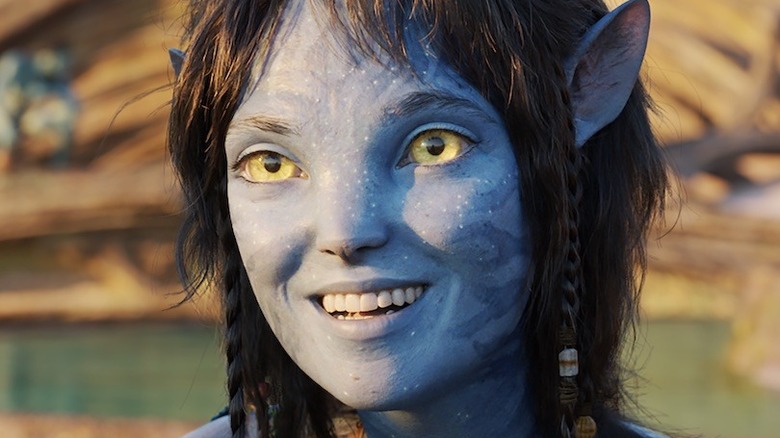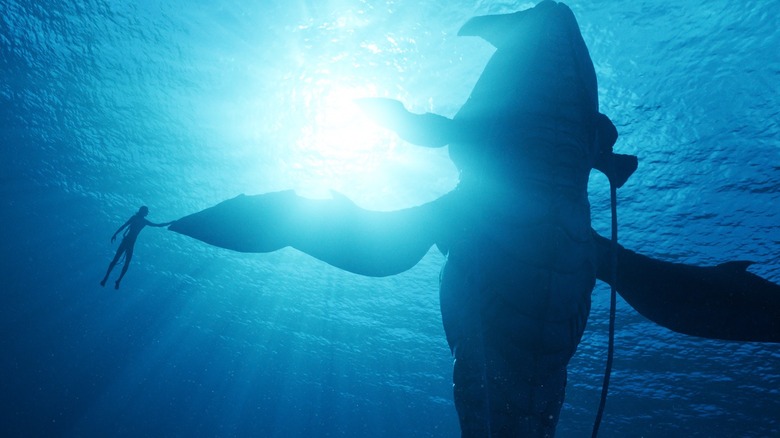Avatar: The Way Of Water Review: A Visually Stunning Yet Unsatisfying Splash Into Pandora
- Stunning visuals, especially in the underwater scenes
- Expertly executed action
- The plot is thin and uninspired
- Good grief, it’s long
A lot has changed since "Avatar" was released in 2009 and quickly became the highest grossing movie of all time. The Marvel Cinematic Universe has become of the surest thing at the box office, and film studios have become increasingly committed to revisiting and rehashing well-established intellectual property. Much of that is at odds with the original story of "Avatar," and especially with the completely new world it created. In fact, that lack of an established franchise beyond a single movie may be the reason "Avatar" has dwindled to something of a footnote in cinematic history in the 13 years since it initially hit movie theaters.
Of course, if "Avatar: The Way of Water" manages to jumpstart the franchise that director James Cameron (as well as production company 20th Century Studios and distributor Disney) envision, that could change. However, after so much time away from the moon of Pandora, during which even the movie's most die-hard fans' ardor may have cooled, it's hard to say exactly who the sequel is trying to entice for a return trip.
One thing that can't be denied: "Avatar: The Way of Water" represents a great deal of meticulous work by Cameron, his cast, and a small army of craftspeople. The movie's combination of motion-capture performances, beautifully rendered CGI, and rip-roaring action are reasons enough to buy a ticket. Unfortunately, its story doesn't live up to all that effort.
An uninspired revenge tale
"The Way of Water" picks up about 15 years after the events of "Avatar," with Jake Sully (Sam Worthington) still living with and leading the forest-dwelling Na'vi. In that time, he and Neytiri (Zoe Saldana) have had three children — Neteyam (Jamie Flatters), Lo'ak (Britain Dalton), and Tuk (Trinity Jo-Li Bliss) — and adopted a fourth named Kiri (Sigourney Weaver). The family's idyllic life is interrupted by the inevitable return of humans, and this time, their goal isn't just to mine for the moon's valuable metal unobtanium but to colonize it as conditions on Earth have devolved even further than they had in the first film.
After being forced from their home yet again by the invading aliens, Jake spends the next year leading raids on the human's assets (including one on a train that looks amusingly like an industrialized monorail from Disney's parks). In order to stop Jake, the military leader in charge, General Ardmore (Edie Falco), calls in a group of deceased Marines that have been resurrected in Na'vi bodies but retain all their human memories. The team happens to be led by Colonel Quaritch (Stephen Lang), the villain who was killed at the hands of Neytiri in the first film. Needless to say, Quaritch is not only happy to take on the mission, he's particularly motivated to put an end to Jake, who he sees as the ultimate traitor.
What follows is an uninspired revenge tale as Quaritch and his team pursue Jake, who flees with his family to the reef clan called the Metkayina. Their arrival provides an opportunity to introduce a whole new Na'vi culture, and the film spends a decent amount of time letting audiences ogle the underwater areas of Pandora alongside the Sully family. However, outside of highlighting some physical differences (the Metkayina's tails and arms are adapted for swimming and their skin is more aqua than blue) and a way of life that revolves around water, the movie is too preoccupied with Quaritch's hunt for Jake to delve too deeply into how the Metkayina differ from the forest-dwelling clans.
Despite the thin plot — and the hard-to-ignore questions about why Quaritch's superiors are letting him continue to pursue Sully now that he's no longer a direct threat to them — the movie still manages to be engrossing. Cameron is an ace action director with classics like "Aliens" and "The Terminator" under his belt, and he proves his bona fides once again here with a number of well-choreographed set pieces that also put various characters in enough peril to keep viewers emotionally invested. Plus, even during scenes of relative peace and calm, it's impossible not to be dazzled by the gorgeous world of Pandora, especially on the reef, where Cameron depicts the underwater flora and fauna with loving wonder.
The Way of Water's strongest message
Despite the weak plot, the movie manages to deliver a compelling message, and it feels like that's where Cameron's real passion lies. Just like in "Avatar," humans (and the recently human, like Quaritch) are the film's black hats — but this time their actions are even more awful. Part of the reason for that has nothing to do with the film itself. After all, we're feeling the impact of climate change much more acutely now than when "Avatar" premiered, so watching humans destroy habitats and misuse natural resources feels even more short-sighted and wasteful than it did in 2009. The other reason is that the film makes the careless devastation inflicted by humans that much more personal through the depiction of the hunting of the tulkun, whale-like creatures that have a spiritual connection with the Metkayina clan. The horror of the humans' actions is portrayed in graphic detail, making it remarkably heartbreaking.
The juxtaposition of the beauty of the reef's underwater world and the way the humans carelessly destroy it helps make a strong case for the conservation of the plants and animals that populate our own planet. Of course, no one would see "The Way of Water" if it were a three-hour polemic on extinction and climate change, so its message of respect for nature is overpowered by its ho-hum plot.
In the end, "Avatar: The Way of Water" is an engaging and gorgeous-looking film that's also not particularly successful as a standalone story. Unlike "Avatar," which wasn't conceived with sequel aspirations, "The Way of Water" is the first in a planned series of four "Avatar" sequels, and despite its excessively lengthy and completely unearned three hours and 10 minute runtime, it feels like it. As a result, the movie isn't an especially satisfying experience. But perhaps that will change as the additional sequels are released and we see Cameron's vision for the world of "Avatar" in full.
"Avatar: The Way of Water" premieres in theaters on Friday, December 16.


